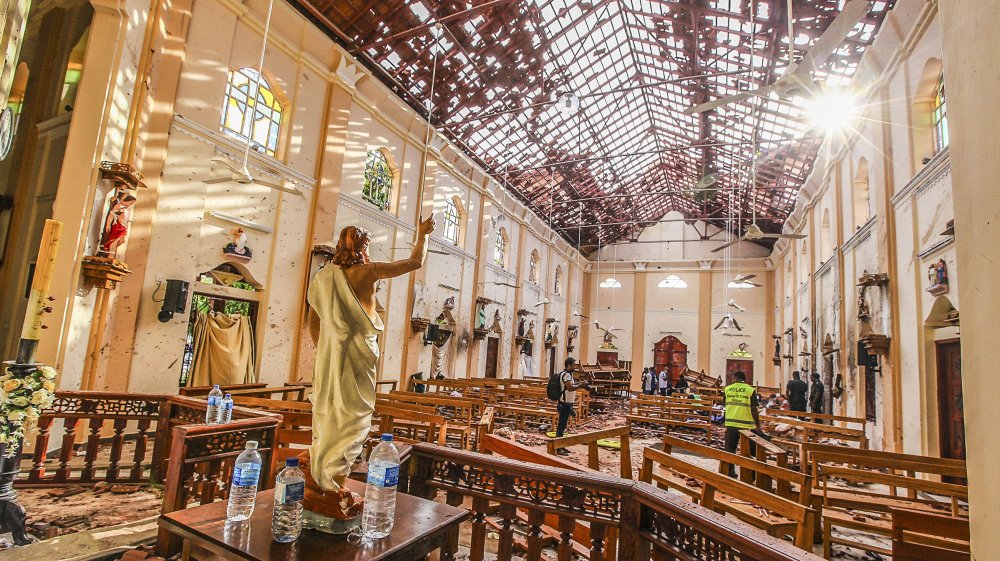Sri Lanka is in a state of absolute chaos, its leadership found wanting in the face of a terrorist mayhem that killed about 300 people in coordinated suicide bomb blasts. We had written about this subject earlier in this column and had wondered whether these attacks had any links to the Christchurch killings. It now seems as if both the events have direct links. The State Minister of Defense of Sri Lanka has put it on record today that the blasts in his country could be reprisals against the New Zealand killings.
While reports are that the Islamic State (IS) claimed responsibility for the attacks, it appears that local hands were assigned the job. The entire region and the world at large could be said to be now at serious risk. For one, the Gulf countries are where Asians work in large numbers. There, among others, are the Sri Lankans, Pakistanis, Indians and those from entire Asia region including Filipinos, too. They mix, and indoctrination could be taking place for fundamentalist pursuits. Even otherwise, despite all the electronic vigil, such campaigns take place via the Internet. Terror has been a growing phenomenon and a great business since the last few decades and the counter steps of the past do not seem to have helped much. The world has suddenly woken up to the fact, after the Christchurch killings, that terror is not just limited to any one religion any more. Although Islamist terror is recognised as the fountainhead of such mindless violence, it may be recalled that ‘suicide bombers’ were first introduced to the world by the Liberation Tigers of Tamil Eelam (LTTE). Countless police, army, members of Parliament of Sri Lanka, including the then incumbent President of that country Ranasinghe Premadasa and former Indian Prime Minister Rajiv Gandhi had fallen prey to LTTE suicide bombers. Those events of the not-so-distant past that remain etched in our memories because the fallen were people of immense public stature, go to prove that suicide bombings and terror are not alien to South Asian countries.
Interestingly, neither the United Nations (UN) nor any developed nation is able to be of much help as is repeatedly proven. Countries like France, New Zealand and many others are repeatedly taking the hit from terror. Since none is spared, the world seems threatened as a whole. Terror is increasingly proving to be a menace that no nation has been able to tackle on its own as yet. The UN, on the other hand, has also been failing in tackling terror outfits of lesser global importance such as the Jaish, or the Lashkar-e-Taiba. Like China, the Americans too have a penchant to tackle matters in a haphazard manner. For one, it treats Pakistan with kid gloves even after the whole world came to know that Al-Qaeda mastermind Osama bin Laden lived under its military protection — and at a time when the US was running around the globe to catch him. The US keeps hemming and hawing against terror but keeps igniting and then running away from the Mid East theatre which sets the situation on an even more hotter plate.
Selective amnesia might help the Americans temporarily but this will not help in tackling global terror. Before finishing a job in Afghanistan, Americans cut and ran from there to invade Iraq. By doing so, George Bush Junior gifted yet another fertile ground for terrorists right inside the Middle East. Thus was born the pro-Sunni outfit, the ISIS. Now, the IS has reached up to a new territory, Sri Lanka, far from the Middle East.
Many years of efforts to contain the IS did not help much. If it was neutralised or done with at one place, it surfaced at another. Syria, torn by civil war, proved to be a fertile ground for it for years, after the terror network originated in the form of a Sunni offensive against the Americans in Iraq in the post-Saddam period. Even though Russian leader Vladimir Putin put his might in Syria to target the IS in tandem with the offensives from the US, the elimination of this dreaded outfit is proving to be impossible. Even Pakistan is keeping its fingers crossed about likely IS offensives there.
It is likely that Sri Lanka was chosen for the retaliation because the local law-enforcement agencies there were relatively weak. This again demonstrates that individual nations need to tie their own shoe laces and face up to this challenge with not only police alertness but, more importantly, social changes. Thus, this menace can only be solved from within each society and nation state.
